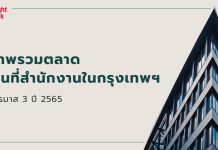Source: property-report.com
The forecast shows strong urban demand – but with a few possible icebergs ahead
Dealing with resale units
Over the years developers have set up subsidiaries to manage rentals and resales within their own vicinity, and many became a collection point for agents who are searching for listings. The end result is that third party agents have managed to get better deals directly with the owners, leading to the downfall of those subsidiaries.
The downside of the resales segment is the direct competition with developers. If a developer is not fast enough to sell off their new units on their own, the resale units will stagnate the selling process by offering lower priced units. In many cases the project is doomed unless a hardcore marketing project can save it. Location is the key selling point for investors and end-users, and in some special cases if the location is desirable, even all resale units sell out eventually.
The oversupply of resale units will be concentrated in crowded areas. New developments are lined up next to each other in emerging districts and can offer more affordable investment and stable returns.
Stricter rules on condominium hospitality management
Looking at the hospitality sector, Thailand has the most hotel properties in Southeast Asia and the Pacific region. Having said that, demand for tourist accommodation is growing year-on-year, opening doors to smaller businesses and individual condominium owners. Foreign buyers are familiar with a buy-to-let scheme, which is not self-evident in Thailand. Therefore developers often collaborate with hospitality companies to set up legal schemes that ensure return on investment or assign their own lease subsidiaries to fill in the supply.
We have all heard about the police raids in several residential areas in the main tourist districts of Thailand, especially in Bangkok, with the aim to terminate illegal hotel operations, such as landlords who rent to tourists, juristic bodies that cooperate with tour operators and online booking systems that are in violation with the Hotel Act
Implementation of the House and Land Tax Acts
If you or your company owns a condominium unit or villa here in Thailand that was used, even if only for one day, by someone other than its legal owner (with or without you having received rental income), then you or your company is liable under the House and Land Tax Act.
These two acts will be enforced more strictly in the coming years. The Ministry of Tourism and several Thai hotel associations are already putting pressure on the ongoing operations, which is getting more complicated due to the implementation of global hospitality groups that modify their business model to a more acceptable operation without breaching the Thai laws and hotel license required mandates.
The rise of AirBnb and similar co-living rental websites is spreading across the globe and the world is evolving into a virtual place that is almost impossible to regulate. As for now the average condo owner in Thailand should not have to worry; raids take place on concentrated locations with clear visual “short-term rental” hotel operations and by bulk.
One thing remains for sure in the minds of investors: Bangkok remains one of the top tourist destinations in the world, where contemporary convenience and all the facilities of the modern world can be found.
Imposing stricter currency laws by China – ‘money makes the world go round’
It has been obvious in the past couple of years that the Thai residential market has received an additional cash-rich investor stream from the Chinese. Chiang Mai and Bangkok metropolitan areas in particular are their prime investment locations. Several mid-priced condos in Sathorn and Phra Khanong in the capital have as much as 40 percent Chinese uptake.
While China imposed various degrees of curbing capital outflow in 2016, not all had been successful, which means foreign currency exchanges in 2017 will be scrutinised even more. The Beijing regime will demand reasons why the exchange needs to take place, and financial institutions will have to report international transactions exceeding a certain amount.
The Chinese government is in a fall, and economic growth has been slower than expected. Next to that the yuan is losing value against other major currencies. So it’s not only multibillion-dollar mergers and acquisitions under close watch, but also hundreds of thousands of individual Chinese investors on the Mainland or overseas.
Despite these measures we foresee a healthy uptake from foreign investors, and in particular Chinese buyers this year. We know from previous experience that investors store their liquidity in banks across the globe – with easy access. The majority of local developers have already lined up their overseas events for 2017.














